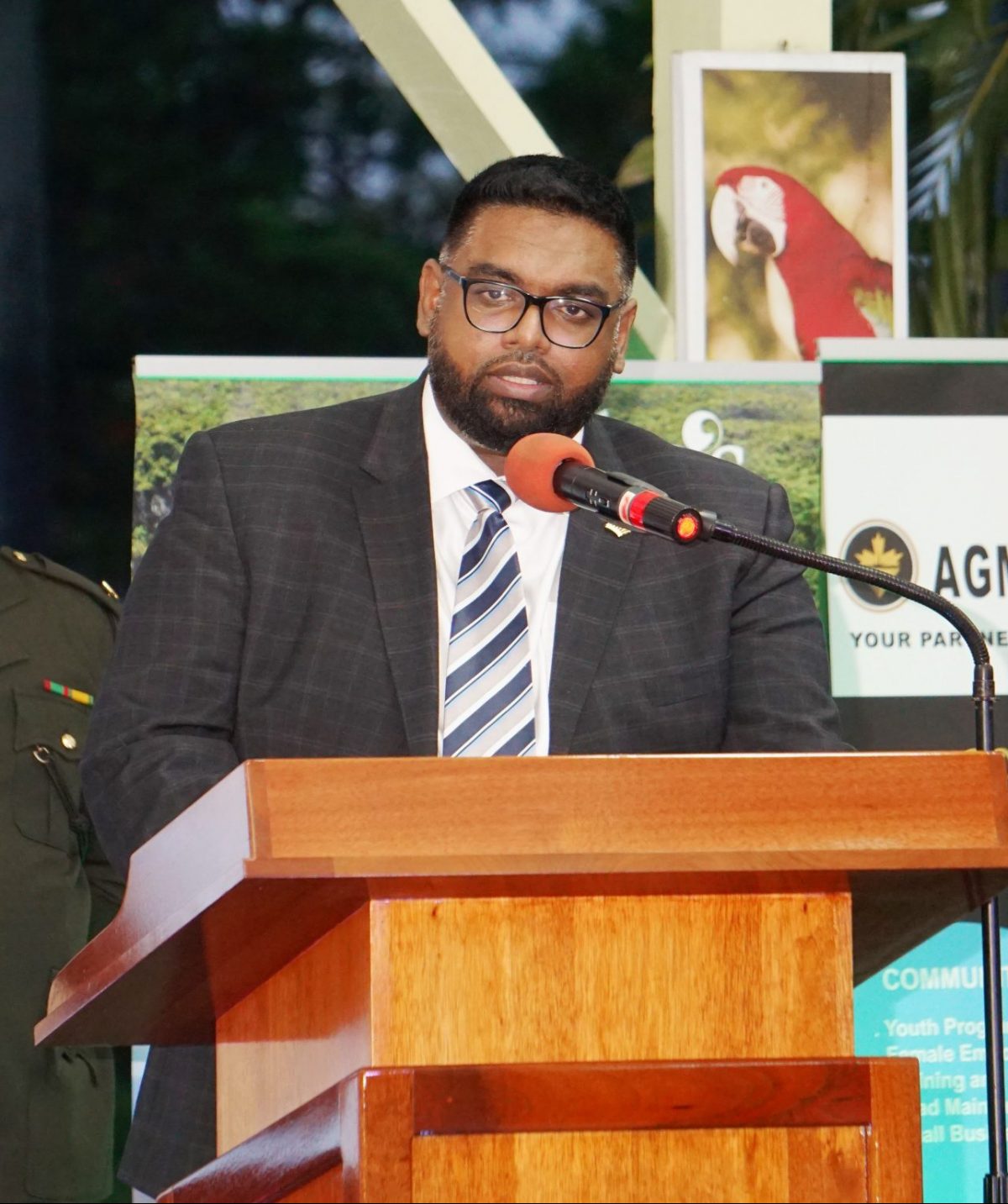President Irfaan Ali on Wednesday projected that there will be at least seven oil producing platforms in Guyana’s waters by the end of 2027 and said foreign capital was crucial to converting the country’s natural resources into wealth.
“The oil and gas sector is going to be instrumental in our national development framework. But our development plans, as I have indicated, do not revolve exclusively around oil and gas but involve all sectors of the economy, Ali said during the opening of the Guyana Basin Summit on Wednesday.
Ali said that the Stabroek Block offshore Guyana has a proven reserve of around 9 billion barrels of crude oil and that the geological formation of the block makes it one of the most prolific blocks in the world. He noted that at least 10 exploration and appraisal wells are scheduled to be drilled this year.
“Liza Phase 1, the first oil field to be developed, has already achieved its nameplate capacity of around 130,000 barrels of oil per day. Liza Phase 2, the second field to be developed, is expected to commence production next year, 2022,” he added, noting that by the end of 2027, at least seven Floating Production Storage and Offloading (FPSO) oil platforms will be operating in Guyana’s waters.
As a result of this, he said, Guyana is set to become an economic and energy epicentre in the Western hemisphere adding that the country will be propelled not only by the Oil and Gas sector but also by other sectors such as tourism.
The President stated that Government will be working with local and international investors to transform Guyana’s economy across all sectors. He added that over the next five there will be an explosion of housing construction and the foundation will be laid for manufacturing and industrial development.
“Our outlook for this year and beyond is extremely promising. Guyanese can anticipate continuous and progressive improvements in their living standards. The economy will expand and become more competitive, and business will thrive. Investors will enjoy increasingly greater opportunities and rewards,” Ali promised, noting that the Government will work to ensure that there is a conducive and enabling environment for business development.
Meanwhile, he disclosed that the government has a number of development plans in mind which include large-scale agricultural investments and mega infrastructural projects which include bridges, a road to Brazil, a deep-water harbour, housing, communities and urban centres, port facilities and digital technology-backed industrial parks and energy development. He noted that they have commenced discussions with Suriname regarding the development of an energy corridor, adding that Brazil and French Guiana, will play important roles in the same project so that together they can develop one of the most competitive energy corridors along the Guiana Shield.
Ali noted that a major catalyst for industrialization will be the planned gas-to-shore energy project and the development of Guyana’s natural resources is key to unlocking this planned economic prosperity. He stated that the Guyana’s natural resources are part of Guyanese patrimony and these resources must be used for the benefit of the people.
“The country’s resources however, are useless to us if they remain unexploited. Foreign and local capital is necessary to convert our natural resources into wealth and to generate jobs. As such, Guyana welcomes private investment. Without such investment, we will remain poor and vulnerable,” he said.
However, he added, that Guyana lacks the scale of financial, technological and human resources needed for the Government’s economic development plans which is why investment is pivotal. He noted that it is important for the local private sector to become more involved in the planned economic transformation.
“It is for this reason that we are developing a draft local content policy and law. This policy and law are not intended to be a disincentive to investment. Rather it is aimed at spurring a stronger and more robust local business environment. Our natural resources must be developed sustainably. We are committed to ensuring a model of development which provides benefits for present and future generations. We will not sacrifice long-term benefits for short-term gains,” he said.
Directly addressing the Guyana Basin Summit, Ali said that in terms of endowment, they have estimated that total Basin potential is around twice our proven reserves. “This is important and further solidifies our position as a lucrative emerging petroleum state,” he said, adding that they intend to maximize the many business opportunities that exist along the value chain of the oil sector and also, expand drilling, exploration, and production activities.
“We welcome investment in the Guyana Basin as well as the multiple opportunities it will spawn within our economy. This Summit is an opportunity for investors to cement their participation in our economy, including in the non-oil sector. I want to take just a few moments to say to all potential investors that you need to come, you need to explore, and you need to look holistically at the varied opportunities in Guyana. Whether it is large scale agriculture production, whether it is mining, whether it is forestry, whether it is in the healthcare system, the education system; you need to understand the varied opportunities Guyana offers for different types of investors. It is not only about oil and gas, oil and gas has really brought attention to Guyana, a sleeping giant in investment opportunities,” he said.









